Space
Replies
-
-
This content has been removed.
-
PlaydohPants wrote: »
Also, one is a combat droid, the other is a protocol droid.0 -
This content has been removed.
-
@PlaydohPants wrote: »
But in the Star War films you see other CP30-model droids and they move the same way. So don't blame it on Annikan.
see previous post about combat droids vs protocol droids.0 -
GnothiSeauton23 wrote: »@PlaydohPants wrote: »
But in the Star War films you see other CP30-model droids and they move the same way. So don't blame it on Annikan.
Blame it on the a-a-a-a-a-Annikan
This is stuck in my head.0 -
@PlaydohPants wrote: »
But in the Star War films you see other CP30-model droids and they move the same way. So don't blame it on Annikan.
see previous post about combat droids vs protocol droids.
No, because I want to be right.
You were right. One barely walks and the other is a Chinese super star.0 -
It's only a 5 year age difference of the characters.
‘Star Wars’ actor Jake Lloyd (Young Anakin) moved to psychiatric facility after spending nearly 10 months in jail0 -
This content has been removed.
-
-
One of these is a frying pan, the rest are moons in our Solar System
 Middle left is a pan.
Middle left is a pan.
Going from left to right down the rows, the moons are as follows;
Ganymede
Io
Europa
Just a frying pan
Callisto
Dione
The Moon (Luna)
Oberon
Dione again, rotated 180 degrees1 -
...the final frontier. These are the voyages of the Starship Enterprise. Its five-year mission: to explore strange new worlds, to seek out new life and new civilizations, to boldly go where no man has gone before.0
-
Black Canyon of the Gunnison National Park owes its name to its deep, dark crevices. The Gunnison River sculpted these walls, cutting thousands of feet into the bedrock. Much of the time, the winding waters at the bottom of the gorge are submerged in shadow.
Even from space, this canyon in Colorado commands attention. The Operational Land Imager (OLI) on the Landsat 8 satellite acquired a natural-color image of the park on September 24, 2013. That image was draped over an ASTER-derived Global Digital Elevation Model to show the area’s topography. At their tallest, the canyon’s near-vertical walls plummet roughly 2,425 feet (740 meters).
The Gunnison River was already cutting into the stone during the Pleistocene era, when melting glaciers strengthened the river’s current. Running hard, the river picked up sand, gravel, and boulders, “efficient tools for canyon-cutting,” according to the Roadside Geology of Colorado. In a process called stream superimposition, the river scoured its way through softer lava and ash, sedimentary rocks and, finally, the hard Precambrian rock below. Today the Gunnison is forced to stay on this beaten path, unable to leave the valley because it is trapped between towering walls of bedrock.
The same geological features that give this landscape jagged edges also test the mettle of hikers who try to climb the inner canyon. For instance, the Warner Route, one of the park’s lengthier trails, spans a vertical drop of roughly 2,700 feet (830 meters)—nearly twice the height of the Empire State Building. The National Park Service website warns: “hikers are expected to find their own way and to be prepared for self-rescue.”
Other visitors come to see the canyon after the Sun sets. The park’s relatively remote location makes it an ideal spot to view stars. In 2015, the Black Canyon became an International Dark Skies Park.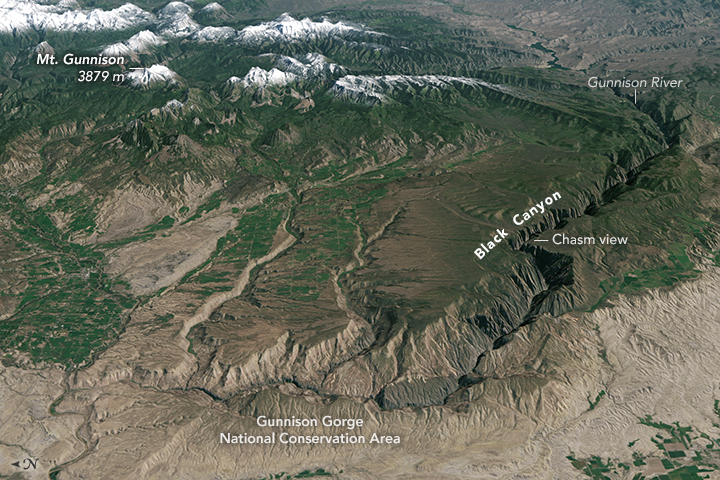 1
1 -
Astronauts aboard the International Space Station (ISS) see the world at night on every orbit —that’s 16 times each crew day. An astronaut took this broad, short-lens photograph of Earth’s night lights while looking out over the remote reaches of the central equatorial Pacific Ocean. ISS was passing over the island nation of Kiribati at the time, about 2600 kilometers (1,600 miles) south of Hawaii.
Knowing the exact time and the location of the ISS, scientists were able to match the star field in the photo to charts describing which stars should have been visible at that moment. They identified the pattern of stars in the photo as our Milky Way galaxy (looking toward its center). The dark patches are dense dust clouds in an inner spiral arm of our galaxy; such clouds can block our view of stars toward the center.
The curvature of the Earth crosses the center of the image and is illuminated by a variety of airglow layers in orange, green, and red. Setting stars are visible even through the dense orange-green airglow.
The brightest light in the image is a lightning flash that illuminated a large mass of clouds. The flash reflected off the shiny solar arrays of the ISS and back to the camera. The dim equatorial cloud sheet is so extensive that it covers most of the sea surface in this view.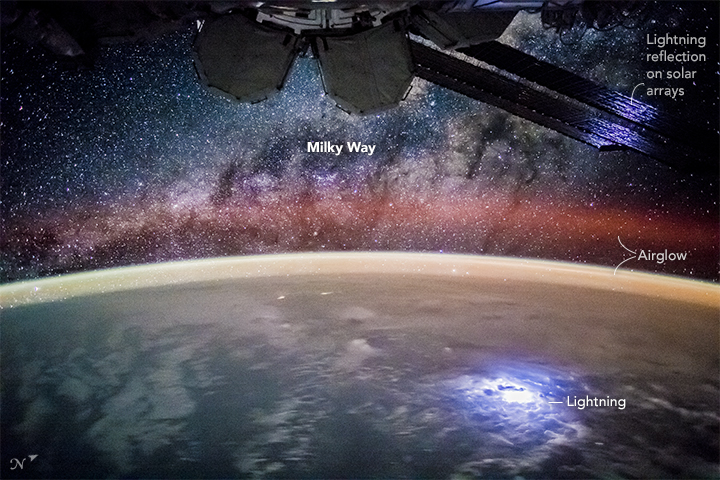 1
1 -
On December 6, 2015, astronauts aboard the International Space Station (ISS) were awaiting the launch of the Cygnus Commercial Resupply Services spacecraft. Cygnus was lofted into space by an Atlas V rocket, with engines that fire for about 18 minutes. This photograph was taken 4 minutes 12 seconds after launch as the crew looked southwest into the dusk sky.
Using a powerful lens, an astronaut captured the spacecraft with the Atlas engines still firing and long tendrils of exhaust trailing back toward Cape Canaveral in Florida. The spacecraft is a tiny object and would otherwise have been invisible to the crew. This photo of the launch was snapped when the ISS was far to the north-northeast over the Atlantic Ocean, just east of Newfoundland.
Sixty-one hours after the launch, Cygnus arrived at the ISS and an astronaut took a close-up image of the resupply ship about to be captured by the Canadarm2 robotic arm. Cygnus ferried various cargo to the orbiting crew, including science investigations, crew supplies, computer resources, hardware for the ISS, and spacewalk equipment—in all totaling 3513 kilograms (7,745 pounds).
Images of spacecraft taken from other spacecraft are always interesting. Astronauts need to know exactly where each spacecraft will be in space and at which precise moment in order to acquire such photographs. You can see another example in this image of the space shuttle Atlantis (STS-135) re-entering the atmosphere in a fiery plasma, as viewed from the ISS.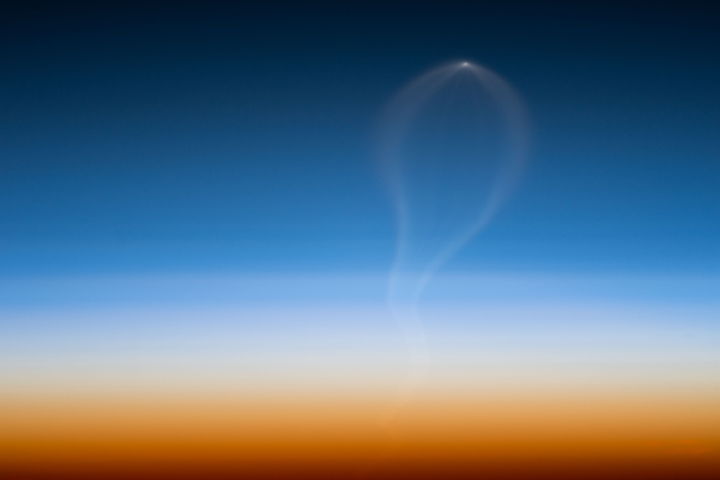 1
1 -
Haven't been following too much for the holidays but just saw that China launched to satellites in orbit, but put them in the wrong orbit. In case anyone doesn't understand the catastrophic events that can happen from this, take a look at how much crap is up in orbit right now. You can even mouseover each object to see its' orbital path.
http://stuffin.space/
Now consider the amount of math and calculations that go into making sure a multi-million dollar satellite you want to put in orbit doesn't conflict with another satllite, or even space debris.
Crazy calcs.1 -
Transit of Venus from ISS
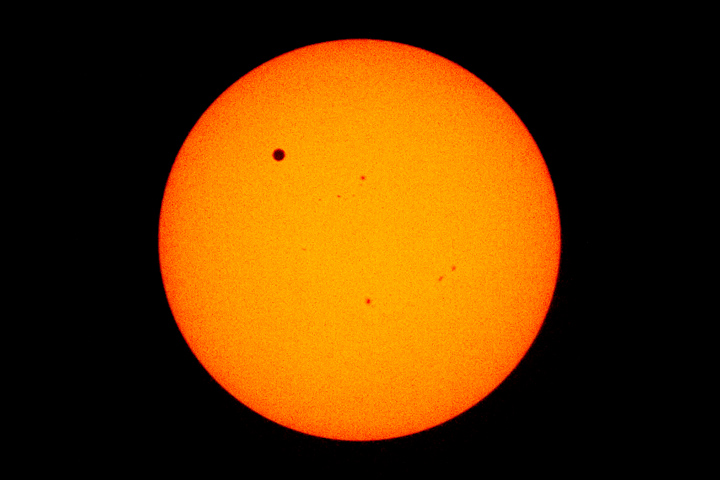 0
0 -
That movie Passengers was pretty good.
 0
0 -
0
-
Except for Death Valley, all of the darkest skies they're showing are in the Cascades. Looks like a little bit of faint aurora in DV, too. Kind of surprising but not unheard of that far south.
I've been in extremely dark places with vivid night skies, like in the Pasayten Wilderness, in Gothic Basin, on Slate Peak, and Sahale Glacier Camp. Maybe down to what the video is calling level 2 but it's hard to say and somewhat subjective (from a video anyway).
@MadMaxV8 keep in mind these are photos we're looking at in the video, and cameras see differently than humans. Lot more info about that, and example pics, earlier on in this very thread.1 -
-
-
-
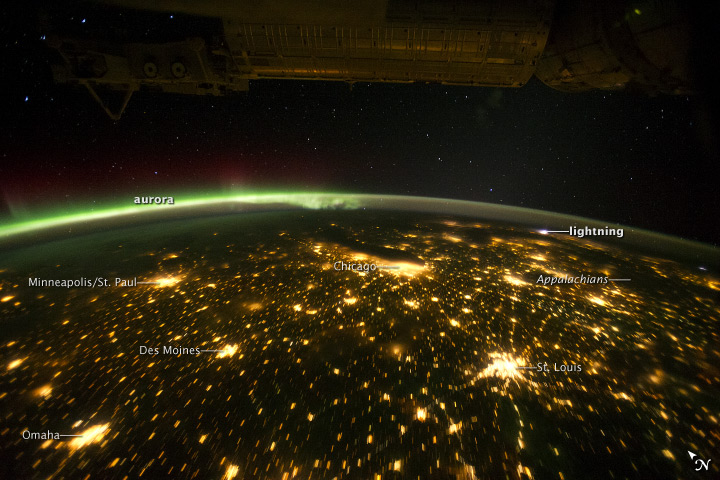 1
1 -
Looking down at a shooting star.
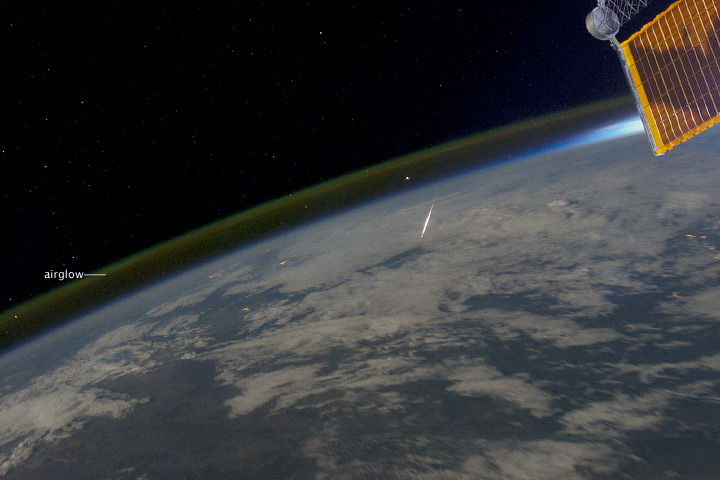 2
2 -
Comet Atlantis
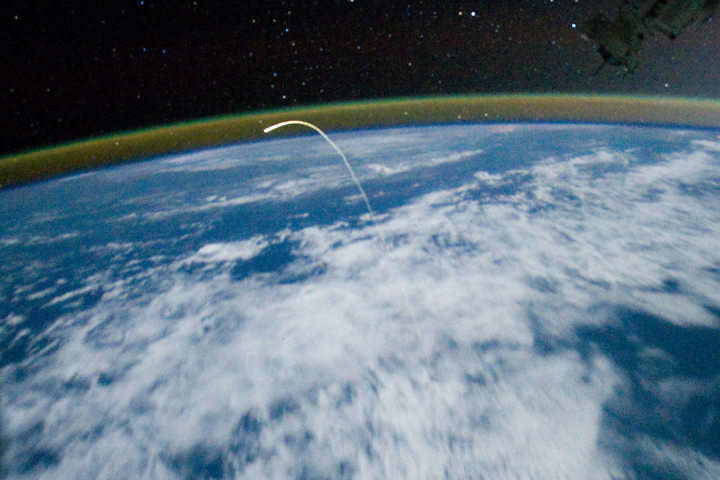 2
2 -
This discussion has been closed.
Categories
- All Categories
- 1.4M Health, Wellness and Goals
- 398.2K Introduce Yourself
- 44.7K Getting Started
- 261K Health and Weight Loss
- 176.4K Food and Nutrition
- 47.7K Recipes
- 233K Fitness and Exercise
- 462 Sleep, Mindfulness and Overall Wellness
- 6.5K Goal: Maintaining Weight
- 8.7K Goal: Gaining Weight and Body Building
- 153.5K Motivation and Support
- 8.4K Challenges
- 1.4K Debate Club
- 96.5K Chit-Chat
- 2.6K Fun and Games
- 4.8K MyFitnessPal Information
- 13 News and Announcements
- 21 MyFitnessPal Academy
- 1.6K Feature Suggestions and Ideas
- 3.2K MyFitnessPal Tech Support Questions


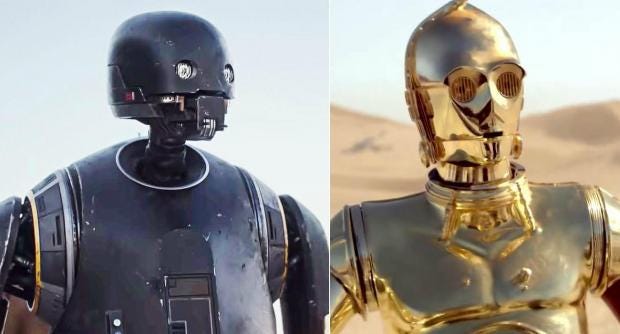






 https://www.youtube.com/watch?v=0FXJUP6_O1w
https://www.youtube.com/watch?v=0FXJUP6_O1w



